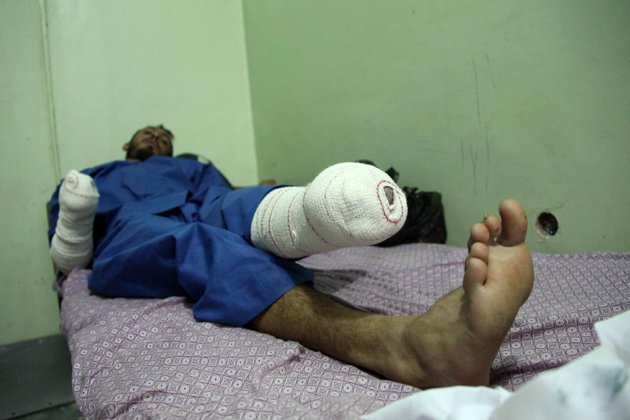By Humayun Hadid & Johannes Dell
Two cases of forced amputations in Afghanistan's Herat province have served as a grim reminder of Taliban-style justice almost 12 years since the movement was ousted from power.
Just over a month ago, Fayz Mohammad and his neighbour Zarin were two ordinary young Afghan men.
They held down good jobs as drivers for a local transport company and were happy to be able to feed their families.
Now both are in hospital in Herat, recovering from an ordeal which has left them traumatised and worried for their future.
In mid-March, 25-year-old Fayz and his younger colleague were enjoying time off duty in their home village in Rabat Sangi district while their trucks were being loaded.
On the second night of their stay, Taliban fighters arrived at 03:00 in the morning and abducted them.
The men were taken more than 100 miles away to Torghundi, a town on the border with Turkmenistan.
"They kept us for 27 days," Fayz told the BBC. "On the 28th day, at 10 in the morning, they cut off our hand and foot."
Resting on a simple bed in Herat's regional hospital, his right arm and left leg heavily bandaged, Fayz recounted his harrowing experience.
"They injected us with a fake anaesthetic from an ampoule," he says. "It didn't have any effect at all."
Fayz says he doesn't know what instrument the men used.
"I just saw a guy with white gloves. I don't know if he was a medic or not. I don't think he was because it took a very long time to cut off my hand. I suffered a lot, it was extremely painful."
Fayz says that he and his colleague were blindfolded during the procedure and that several men held their limbs and sat on their chests to keep them still.

Said, 26, rests in a hospital ward in Herat city after receiving treatment for the amputation of a leg and an arm by Taliban insurgents, west of Kabul, Afghanistan, Sunday, April 21, 2013. Two villagers were admitted to a hospital in Herat city in western Afghanistan on Sunday, two days after the Taliban accused them of helping to escort coalition convoys and punished them by cutting a hand and a foot off each man, said Noor Khan Nekzad, a spokesman for provincial chief in Herat province. (Photo: Hoshang Hashimi/AP)
Blood transfusion
There is confusion over what the two drivers were actually accused of.
Some reports suggest the two men were suspected of stealing, others say that they were targeted because their company worked for the Western troops in the country.
Fayz says that he and Zarin never did anything wrong and that they were used to set an example and send a warning to others. He says there was no kind of trial.
"There was no mullah, no judge, nobody," he says. "There were only Taliban. They were all laughing and making fun while they did this. They never listened to what we had to say."
Fayz also says that the insurgents offered to set them free if they agreed to plant explosives on one of the company trucks, but they refused.
A spokesman at the hospital told the BBC that the men had been found next to a main road and were brought to the clinic by drivers who spotted them.
The hospital says that Fayz and Zarin arrived around three hours after they lost their limbs and needed blood transfusions.
Their wounds needed surgery to help them heal properly and avoid infection. Doctors say that the amputation appeared to have been conducted by someone with medical knowledge as no bones had been broken.
Fayz says he is worried about how he will work in future and hopes he can be fitted with a prosthetic limb.
Sharia calls
The case is a reminder of the punishments meted out by the Taliban authorities when they ruled much of the country between 1996 and 2001.
Citing Sharia law, Taliban officials carried out lashings, stonings, amputations and executions in public places such as squares, schools or sports grounds.
The sports stadiums in Kabul and Kandahar were notorious for such spectacles with thousands of people attending.
Taliban fighters would ensure a high turnout by driving through neighbourhoods announcing punishments through mounted loudspeakers.
Amputations were usually carried out by trained doctors, who operated with their faces covered for fear of reprisals.
In many cases a local anaesthetic was applied before the limb was removed with simple surgical instruments.
The punishment for theft was the loss of a hand, depending on the severity of the crime.
Amputees would often faint as the severed limb was paraded to the crowd before burial.
But Taliban-style justice has once again been observed in many parts of the country in recent years as the insurgency maintains its momentum.
There have been numerous reports of fighters meting out punishments usually in areas they control or where they have a significant or temporary presence.
In August 2010, the Afghan authorities released a video showing a couple being stoned to death in Northern Kunduz province after a Taliban court found them guilty of adultery.
In the same month Taliban fighters publicly flogged and executed a pregnant Afghan widow in the Baghdis area, after accusing her of an illicit affair.
Last year, insurgents were reported to have shot a woman for alleged adultery in Parwan province.
But beyond such extreme cases, Taliban courts are active in many parts of the country - intervening in local disputes, often at the request of villagers who have lost faith in the notoriously corrupt Afghan justice system.
And with the withdrawal of international troops and the ongoing search for a peace agreement with the Taliban, some favour a revival of strict Islamic law.
A gathering of more than 300 Afghan Islamic clerics three years ago called on President Hamid Karzai to enact Sharia, including the kind of punishments the Taliban have become notorious for.



